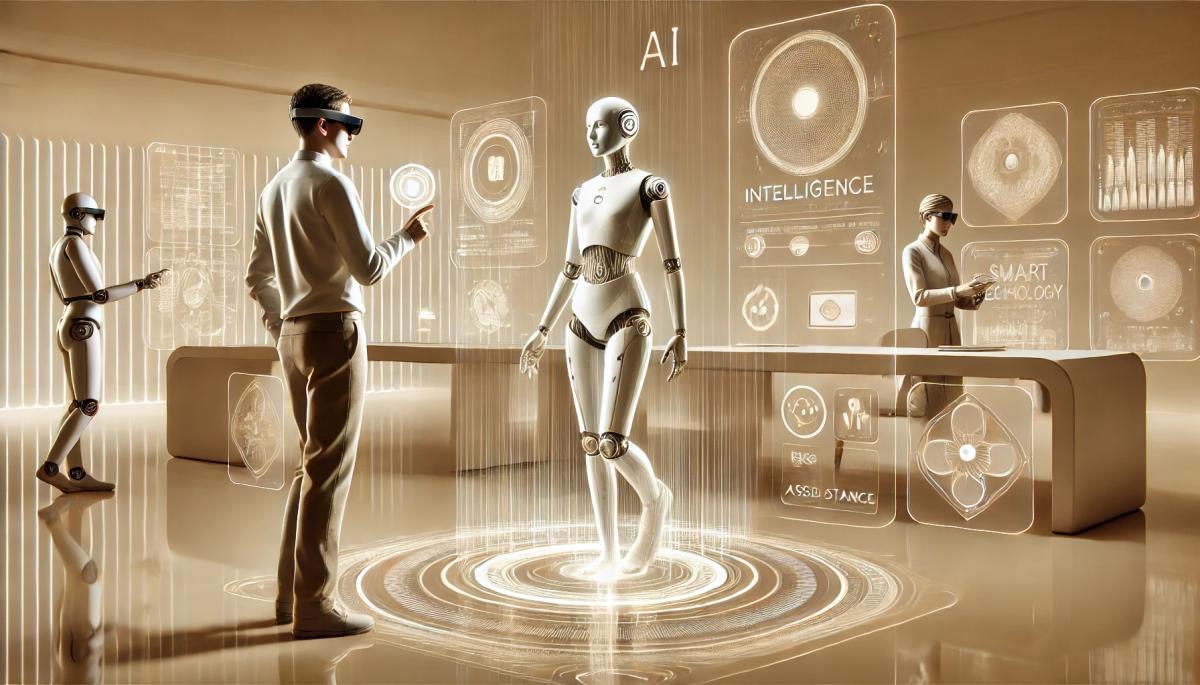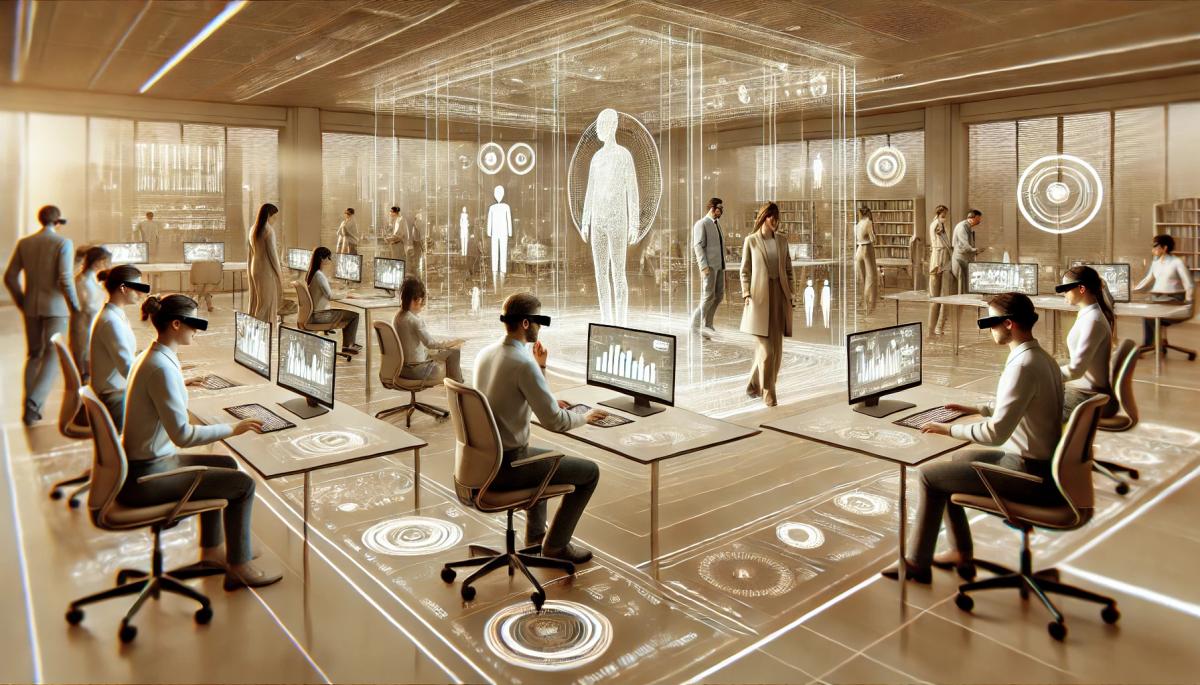the online world in 2050: what awaits us in the digital future?
Do you want to know what awaits us in 2050? Forget flying cars, the real revolution will happen online. Artificial intelligence will advise us on what to wear, smart homes will take care of shopping, and in virtual reality, we will have coffee with a friend from across the world.

We live in an era of technological revolution, which continuously brings new discoveries. That is why some predict that our world will look like a true sci-fi movie in a few years. But is this really the case? Join us as we explore where, according to some experts and scientists, we might be heading by 2050.
Ubiquitous artificial intelligence
Our daily lives will likely depend on artificial intelligence. Instead of single-use applications or smart assistants as we know them today, AI will become a universal guide, recognizing our moods, needs, and even predicting our desires.
Thanks to advanced machine learning, artificial intelligence will be able to provide tailored advice in areas such as education, healthcare, and personal finance. However, it will also bring many ethical questions, including how to ensure it respects users' privacy and does not jeopardize their safety.
This will also lead to an increase in legal disputes, prompting governments worldwide to introduce new legislation and regulations.
The internet of things on an entirely new level
The Internet of Things (IoT), or the interconnection of physical devices and systems via the internet, will experience tremendous growth by 2050. Imagine cities where everything from transportation systems to home appliances is connected and automated.
Smart homes will become the standard, with your house responding to your wishes and needs without you having to do anything. Your refrigerator will automatically order groceries, lighting will adjust to your mood, and your mirror will offer lifestyle recommendations based on your health analysis.

Virtual and augmented reality
With the further development of virtual (VR) and augmented reality (AR), the line between the digital and real world will blur even more. People will be able to enter entirely different realities through VR and AR or enrich their everyday reality with digital elements.
Work, education, and social interactions will move into the virtual space, where people will meet, have fun, and collaborate regardless of distance. We might be heading towards a time when even personal doctor visits or business meetings take place in the digital realm, using realistic avatars in environments that perfectly mimic the real world.
Blockchain and data security
Blockchain technology has the potential to significantly affect the security and transparency of the online world. It is expected that by 2050, blockchain systems will be the foundation of all digital transactions, contracts, and identities.
This technology will enable more secure and transparent data processing, which could reduce cyber threats and fraud. The future of blockchain might also include decentralized social networks and applications, where each user controls their data without relying on central servers.
Digital economy and the future of work
Work in 2050 will look completely different from today. With the rapid rise of automation and AI, many current professions will become a thing of the past. However, the digital economy will offer new opportunities and job roles that we don't even know about today.
Traditional office environments will be replaced by virtual offices, where people work through VR headsets. Flexibility of work and new forms of digital skills will become crucial aspects.
The form of education will also change, being more focused on technology, data, and creativity. Instead of traditional studies, there will be a growing demand for online courses, allowing people to change jobs within months without studying for years.

Advanced personalization and digital identity
Digital identity and personalization will reach new levels. Thanks to advanced data analysis and machine learning, applications and services will be tailored to the specific needs and preferences of users.
By 2050, every user will have a unique digital "signature" that will accompany them across all digital services, from social networks to banking services. However, digital identity will also raise questions about privacy and security, leading to a higher demand for technologies that protect privacy.
Interactive entertainment and games
Online entertainment and the gaming industry will undergo significant transformation. Games in 2050 will offer realistic virtual worlds that respond to every player’s movement and gesture. Virtual concerts, festivals, and interactive shows will bring entertainment directly to viewers in the form of a fully immersive digital experience.
With advancements in VR and AR, it will be possible to literally step into the story of movies and series, becoming the main character and influencing the plot. Entertainment in 2050 will be a completely different experience than we know today.
The online world in 2050 promises amazing possibilities and innovations that will change our daily lives. From artificial intelligence to virtual reality, technologies will connect people across continents, provide personalized services, and offer new forms of entertainment. However, the future will also bring many challenges, especially in the area of security and ethics.
12 steps to prepare a child for their first phone

A first mobile phone can make a child's communication and daily orientation easier, but it also opens topics that are good to address in advance. These include safety, sharing, communication, or screen time. How to prepare a child for their first phone so that they use it safely, calmly, and wisely?
Autonomous vehicles around the world: How close are we to regular driverless operation?

Cities around the world are seeing an increase in autonomous vehicles as part of their transportation systems. However, their reliability varies significantly by region. We will explore where this technology is already commonly transporting passengers and what autonomous driving means in practice today.
Introducing Auracast - the biggest advancement in Bluetooth listening in recent years

Listening to a movie or playlist on multiple headphones has always been difficult. Auracast offers the ability to play the same audio to multiple people without pairing or special accessories. It can be used at home with TV, on trips, and in places with poorly audible announcements. In the article, we will show how this innovation works in practice and when we will start encountering it regularly.
Lost signal? A satellite phone won't leave you disconnected

Losing signal in the middle of the mountains or on the open sea no longer has to mean a loss of connection to the world. A satellite phone works even where regular mobile networks end. In the article, you'll learn how the device connects via satellites, what types of networks exist, how much calls cost, and why satellite communication is becoming more accessible for ordinary users.
Leaked passwords: How to find out if someone has obtained your data

Data breaches happen all the time and can affect anyone. Even strong login credentials can appear in the database of leaked passwords circulating on the internet. In the article, you will learn how to perform a password check using verified tools and find out if someone has gained access to your accounts.
Internet via light or how does Li-Fi work?

With the growing number of connected devices and the increased volume of data being transmitted, new ways are being sought to speed up and improve network efficiency. Internet via light, referred to as Li-Fi technology, uses LED lighting for wireless data transmission and promises higher speed and greater security. Let's see how it works and where it's already being tested.